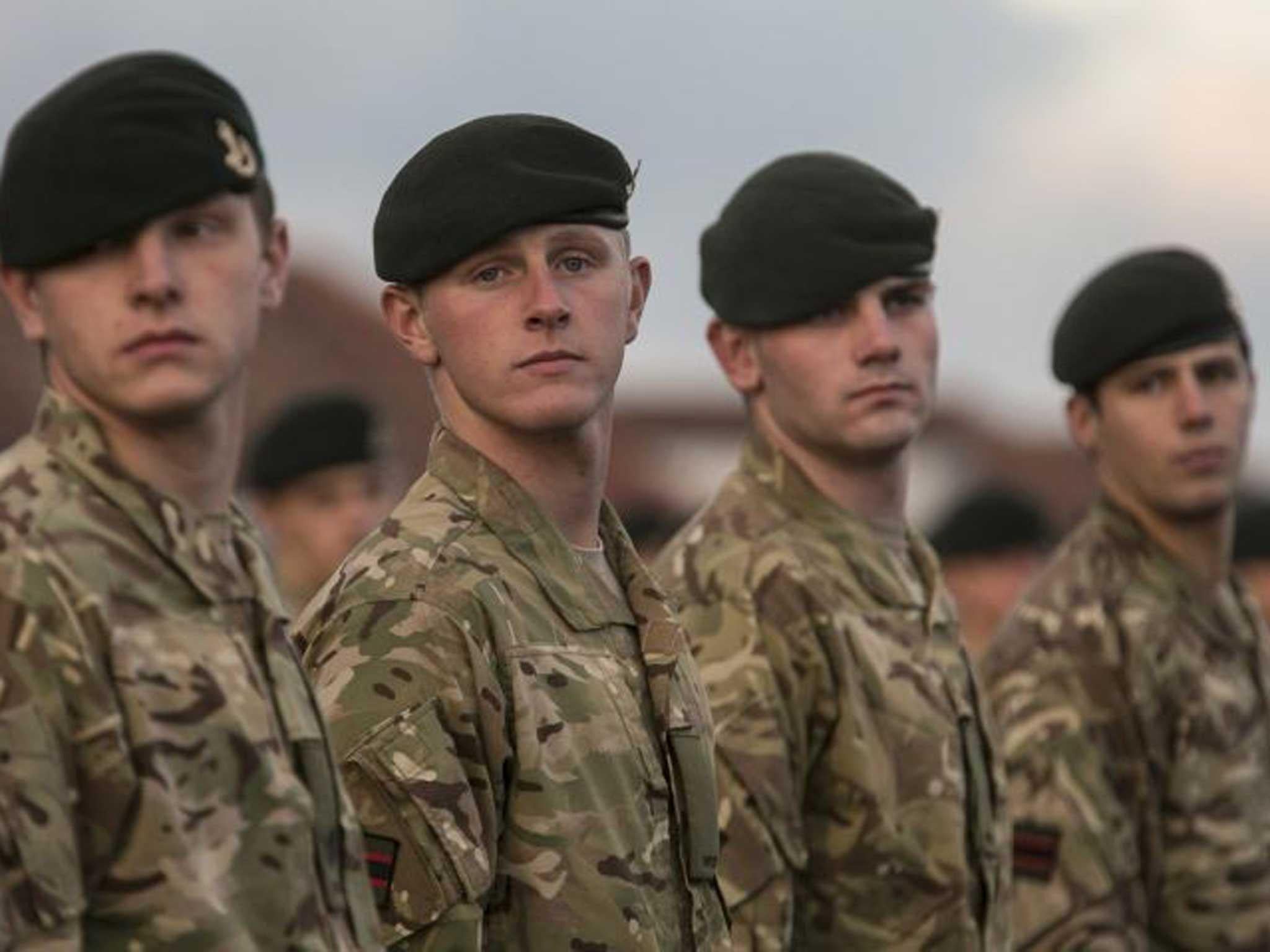UK under fire for recruiting an 'army of children'
MoD finds itself in the company of countries such as North Korea over use of teenage soldiers

Your support helps us to tell the story
From reproductive rights to climate change to Big Tech, The Independent is on the ground when the story is developing. Whether it's investigating the financials of Elon Musk's pro-Trump PAC or producing our latest documentary, 'The A Word', which shines a light on the American women fighting for reproductive rights, we know how important it is to parse out the facts from the messaging.
At such a critical moment in US history, we need reporters on the ground. Your donation allows us to keep sending journalists to speak to both sides of the story.
The Independent is trusted by Americans across the entire political spectrum. And unlike many other quality news outlets, we choose not to lock Americans out of our reporting and analysis with paywalls. We believe quality journalism should be available to everyone, paid for by those who can afford it.
Your support makes all the difference.More than one in 10 new Army recruits are boy soldiers of just 16 years old, according to the latest figures released by the Ministry of Defence. And more than one in four of all new Army recruits are under 18 – too young to be sent into combat.
The figures, released last week, have sparked renewed criticism of the British Army's use of boy soldiers. Following an outcry over the deployment of 17-year-olds to the Gulf War in 1991, and to Kosovo in 1999, the Army amended its rules stopping soldiers under 18 from being sent on operations where there was a possibility of fighting. Despite this, at least 20 soldiers aged 17 are known to have served in Afghanistan and Iraq due to errors by the MoD.
Critics claim the figures mean Britain stands alongside some of the world's most repressive regimes by recruiting children into the armed forces – among under 20 countries, including North Korea and Iran, that allow 16-year-olds to join up. They accused the MoD of deliberately targetting teenagers not old enough to vote in a bid to boost recruitment.
There are more than 1,700 teenagers in the armed forces below voting age. The vast majority of 16- and 17-year-olds are in the Army, according to the 2014 annual personnel report. And the proportion of Army recruits aged just 16 has risen from 10 per cent in 2012-13 to 13 per cent in 2013-14. Many of them would have begun the enlistment process when they were 15, according to campaigners.
"By recruiting at 16, the UK isolates itself from its main political and military allies and finds itself instead sharing a policy with the likes of North Korea and Iran. These are not states which the UK would normally want its military to be associated with," said Richard Clarke, director of Child Soldiers International.
And Paola Uccellari, director of Children's Rights Alliance for England, said: "Targeting children for recruitment into the armed forces puts them at risk of serious and irreparable harm. The Government should not rely on children to plug gaps in the armed forces."
Despite mounting pressure internationally, with UN bodies such as Unicef, the Committee on the Rights of the Child, and the UN Secretary-General's Special Representative for Children and Armed Conflict all in favour of the recruitment age being raised to 18, the MoD continues to take on 16-year-olds.
"Research has shown that 16-year-old recruits are much more likely than adults to suffer bullying and harassment, to develop serious mental health problems, to be injured in training, and to be killed once they reach deployable age," added Mr Clarke. "The MoD might think that it's a quick fix to use children to fill the Army roles adults don't want to do, but it's unethical and operationally unsound," he said.
Critics believe a mounting military recruitment crisis in the armed forces is one reason behind the increases. Plans to create tens of thousands of reservists to fill the gap left by mass redundancies of serving soldiers are understood to be well behind expectations. Reserves currently number 22,010, an increase of 30 compared with 12 months ago. At the current rate of recruitment, it will take more than four centuries to meet the target of a 35,000-strong reserve force by 2018.
An MoD spokesperson dismissed the concerns as "nonsense". "A career in the armed forces provides young people with benefits and opportunities, equipping them with valuable and transferable skills for life, so it is encouraging that young people continue to recognise this and are coming forward to serve their country." The MoD has "procedures in place to ensure no one under 18 may join our armed forces without the formal written consent of their parent or guardian and no one under 18 can deploy on operations".
Colonel Richard Kemp, former commander of British forces in Afghanistan, defended the practice of recruiting 16-year-olds. "Some of the finest soldiers I commanded during my 30 years in the Army started their careers as juniors, enlisting at 16." The approach "unquestionably boosts the quality and fighting effectiveness of the armed forces". He added: "Calling this scheme unethical and operationally unsound not only betrays Child Soldiers International's ignorance of military matters but also insults the young men and women who serve their country with courage, pride and distinction."
But Madeleine Moon MP, a member of the Commons Defence Select Committee, described the increase in recruitment of under-18s as "alarming". "The failure to recruit adults should not be used as an excuse to flood the Army with vulnerable youngsters."
Join our commenting forum
Join thought-provoking conversations, follow other Independent readers and see their replies
Comments